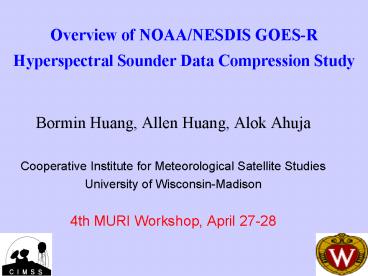Overview of NOAANESDIS GOESR Hyperspectral Sounder Data Compression Study - PowerPoint PPT Presentation
1 / 15
Title:
Overview of NOAANESDIS GOESR Hyperspectral Sounder Data Compression Study
Description:
Overview of NOAANESDIS GOESR Hyperspectral Sounder Data Compression Study – PowerPoint PPT presentation
Number of Views:77
Avg rating:3.0/5.0
Title: Overview of NOAANESDIS GOESR Hyperspectral Sounder Data Compression Study
1
Overview of NOAA/NESDIS GOES-R Hyperspectral
Sounder Data Compression Study
- Bormin Huang, Allen Huang, Alok Ahuja
- Cooperative Institute for Meteorological
Satellite Studies - University of Wisconsin-Madison
- 4th MURI Workshop, April 27-28
2
- What is hyperspectral sounding data?
- It is generated from an interferometer (e.g.
HIS, AERI, CrIS, - IASI) or a grating sounder (e.g. AIRS).
- It consists of several thousand spectral
channels that span the - infrared region on the order of one wavenumber
or less - What is hyperspectral sounding data for?
- to retrieve
- - atmospheric temperature, water vapor, and
trace gases profiles - - cloud aerosol properties,
- - surface temperature, emissivities, etc.,
- to derive wind from radiance or retrieved water
vapor fields, - for better weather and climate prediction.
- Why does it require compression?
- Unprecedented volume of 3D data that consists of
one spectral - and two spatial dimensions (10-100 GB per day)
- Beneficial to efficient data transfer and
archive. - What is new for the data compression society?
- High correlation among remote disjoint channels
due to the - absorption of the same absorbing gases.
3
- Lossless Compression Study
- 2D Wavelet-Based Compression Scheme
- JPEG2000 2D IWT ? Bitplane Coding ? Entropy
Coding - 3D Wavelet-Based Compression Schemes
- 3D IWT ? 3D EZW ? Entropy Coding
- 3D IWT ? 3D SPIHT ? Entropy Coding
- 3D IWT ? 1D BWT ? Entropy Coding
- 2D Predictor-Based Compression Schemes
- CALIC 2D Gradient-adjusted Prediction ? Entropy
Coding - JPEG-LS 2D Nonlinear Prediction ? Entropy
Coding
4
2D Wavelet Transform
Integer Wavelet Transform (Lifting Scheme)
5
Wavelet based Schemes
- JPEG2000
- A new ISO/IEC (International Organization for
Standardization/International Electrotechnical
Commission) compression standard. - Successor to the DCT (discrete cosine
transform)-based JPEG algorithm.
IWT with 3 stages (Taubman et. al. 2000)
6
3D Wavelet Tree Coding
3D EZW It uses the spatial hierarchical tree
relationship of the wavelet transform
coefficients for efficient compression. 3D
SPIHT Refinement of the EZW scheme that provides
better compression while having faster encoding
and decoding times.
Parent-child interband relationship and locations
for EZW and SPIHT coding
7
Predictor-Based Schemes
- 2D Context-based Adaptive Lossless Image Codec
(CALIC) - Among the nine proposals in the initial
ISO/JPEG evaluation in July 1995, CALIC was
ranked first. - It is considered the benchmark for lossless
compression of continuous-tone images.
Schematic description of the CALIC encoder
Neighboring pixels used in prediction (Wu et. al.
1997)
8
- 2D JPEG-LS
- Published in 1999 as a lossless compression
standard of the ISO/IEC.
Neighborhood of JPEG-LS used in prediction
Schematic description of the JPEG-LS encoder
9
Burrows Wheeler Transform
- Block-sorting compression scheme Burrows et al,
1994 - Rearranges the positions of the data such that
the few distinct values under the same previous
context are grouped together in position.
tennessee tennessee ennesseet
tennessee nnesseete
sseetenne nesseeten etennesse esseete
nn nnesseete sseetenne
nesseeten seetennes esseetenn eetenne
ss seetennes etennesse
eetenness tennessee ennesseet
An example of the Burrows-Wheeler
transform. bwt(tennessee) tsennesee. The
matrix on the right is obtained by sorting the
rows of the left matrix in right-to-left
lexicographic order. denotes end of the data
block and can be considered as the smallest
symbol.
10
Ten selected AIRS granules on Sept. 6, 2002
AIRS radiance field at wavenumber 900.3cm-1 for
the selected granules
11
AIRS radiance field at wavenumber 900.3cm-1 for
the selected granules
12
Compression ratios of different algorithms for
the 10 selected AIRS granules
13
- Bias-Adjusted Reordering (BAR) Scheme
- for Data Preprocessing
- Hyperspectral sounder data features strong
correlations in disjoint spectral regions
affected by the same type of absorbing gases at
various altitudes. - The Bias-Adjusted Reordering (BAR) scheme is
used for exploring the correlation among remote
disjoint channels. - The technique can be used to improve the
compression ratio of any existing scheme. - The BAR scheme paper is accepted to be published
in Optical Engineering. - We are in the process of patent application.
14
Effect of the BAR scheme on various compression
algorithms for the 10 selected AIRS granules
15
Summary
- In support of the NOAA/NESDIS GOES-R data
processing studies, we investigated lossless
compression of 3D hyperspectral sounding data
using wavelet-based schemes (3D EZW, 3D SPIHT,
JPEG2000) and predictor-based schemes (CALIC,
JPEG-LS). - The performance rank from best to worst in terms
of compression ratios before the BAR scheme is
given in the order of JPEG-LS, 3D SPIHT,
JPEG2000, CALIC, BWT and 3D EZW. - The performance rank from best to worst in terms
of compression ratios after the BAR scheme is
given in the order of JPEG-LS, JPEG2000, CALIC,
3D SPIHT, BWT and 3D EZW. - To take advantage of the spectral correlations,
we applied the BAR scheme to significantly
improve the compression performance of all the
compression algorithms.
Acknowledgement This research is supported by
NOAA NESDIS OSD under grant NA07EC0676.































